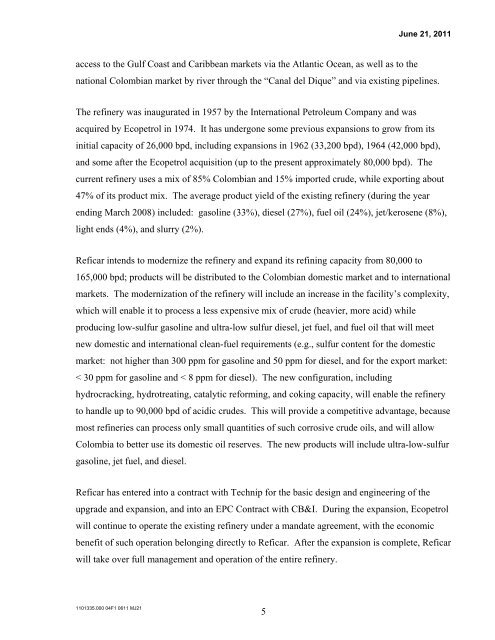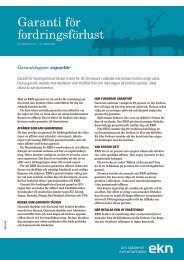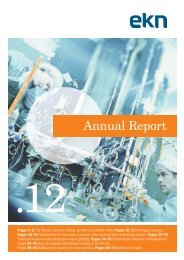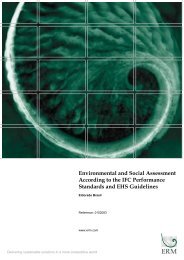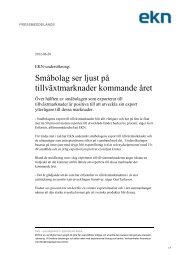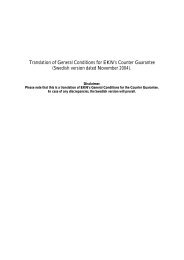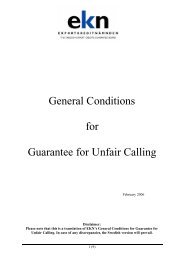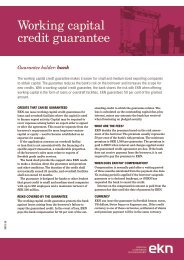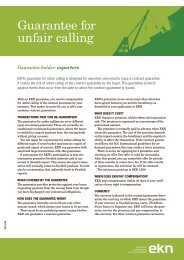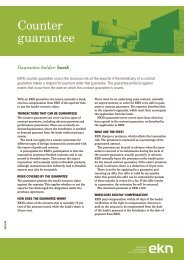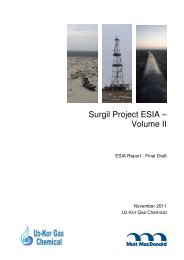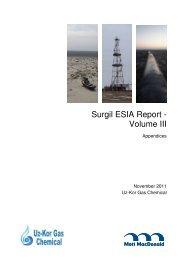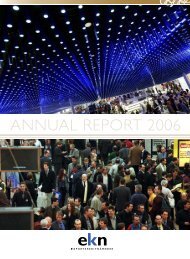Reficar Cartagena Refinery Expansion, Colombia - EKN
Reficar Cartagena Refinery Expansion, Colombia - EKN
Reficar Cartagena Refinery Expansion, Colombia - EKN
Create successful ePaper yourself
Turn your PDF publications into a flip-book with our unique Google optimized e-Paper software.
access to the Gulf Coast and Caribbean markets via the Atlantic Ocean, as well as to the<br />
1101335.000 04F1 0611 MJ21<br />
5<br />
June 21, 2011<br />
national <strong>Colombia</strong>n market by river through the “Canal del Dique” and via existing pipelines.<br />
The refinery was inaugurated in 1957 by the International Petroleum Company and was<br />
acquired by Ecopetrol in 1974. It has undergone some previous expansions to grow from its<br />
initial capacity of 26,000 bpd, including expansions in 1962 (33,200 bpd), 1964 (42,000 bpd),<br />
and some after the Ecopetrol acquisition (up to the present approximately 80,000 bpd). The<br />
current refinery uses a mix of 85% <strong>Colombia</strong>n and 15% imported crude, while exporting about<br />
47% of its product mix. The average product yield of the existing refinery (during the year<br />
ending March 2008) included: gasoline (33%), diesel (27%), fuel oil (24%), jet/kerosene (8%),<br />
light ends (4%), and slurry (2%).<br />
<strong>Reficar</strong> intends to modernize the refinery and expand its refining capacity from 80,000 to<br />
165,000 bpd; products will be distributed to the <strong>Colombia</strong>n domestic market and to international<br />
markets. The modernization of the refinery will include an increase in the facility’s complexity,<br />
which will enable it to process a less expensive mix of crude (heavier, more acid) while<br />
producing low-sulfur gasoline and ultra-low sulfur diesel, jet fuel, and fuel oil that will meet<br />
new domestic and international clean-fuel requirements (e.g., sulfur content for the domestic<br />
market: not higher than 300 ppm for gasoline and 50 ppm for diesel, and for the export market:<br />
< 30 ppm for gasoline and < 8 ppm for diesel). The new configuration, including<br />
hydrocracking, hydrotreating, catalytic reforming, and coking capacity, will enable the refinery<br />
to handle up to 90,000 bpd of acidic crudes. This will provide a competitive advantage, because<br />
most refineries can process only small quantities of such corrosive crude oils, and will allow<br />
<strong>Colombia</strong> to better use its domestic oil reserves. The new products will include ultra-low-sulfur<br />
gasoline, jet fuel, and diesel.<br />
<strong>Reficar</strong> has entered into a contract with Technip for the basic design and engineering of the<br />
upgrade and expansion, and into an EPC Contract with CB&I. During the expansion, Ecopetrol<br />
will continue to operate the existing refinery under a mandate agreement, with the economic<br />
benefit of such operation belonging directly to <strong>Reficar</strong>. After the expansion is complete, <strong>Reficar</strong><br />
will take over full management and operation of the entire refinery.


